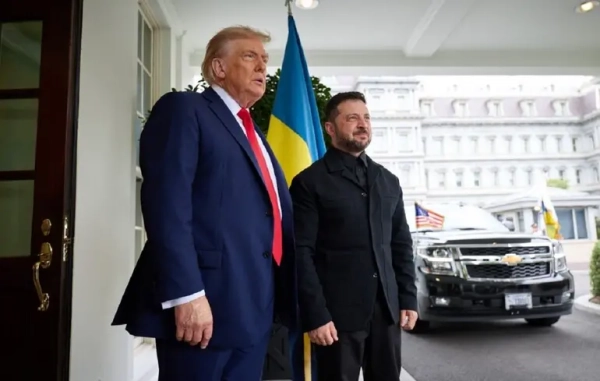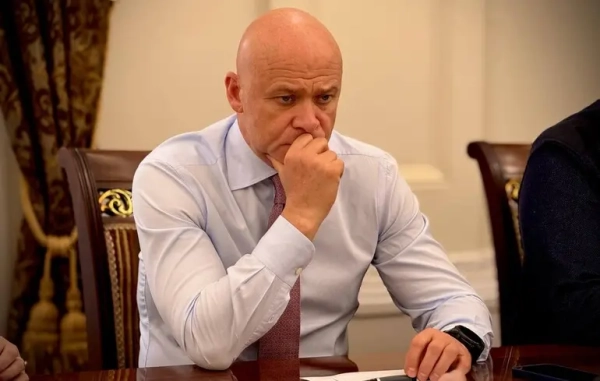Former President Donald Trump's legal battles are piling up: in Washington, Georgia, New York — the list goes on.
But even if all of those cases work out in his favor, advocates say a new legal challenge could still sideline him.
Separate from the criminal cases, over the past few weeks a growing body of conservative scholars have raised the constitutional argument that Trump's efforts to overturn the results of the 2020 election make him ineligible to hold federal office ever again.
That disqualification argument boils down to Section 3 of the U.S. Constitution's 14th Amendment, which says that a public official is not eligible to assume public office if they "engaged in insurrection or rebellion against" the United States, or had "given aid or comfort to the enemies thereof," unless they are granted amnesty by a two-thirds vote of Congress.
Advocacy groups have long argued that Trump's behavior after the 2020 election fits those criteria. The argument gained new life earlier this month when two members of the conservative Federalist Society, William Baude and Michael Stokes Paulsen, endorsed it in the pages of the Pennsylvania Law Review.
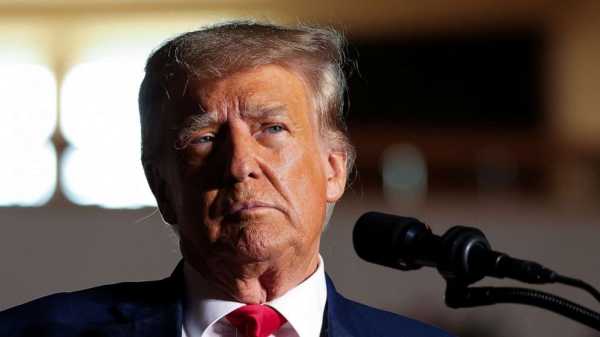
Former President and Republican presidential candidate Donald Trump reacts as he holds a campaign rally in Erie, Pa., on July 29, 2023.Lindsay Dedario/Reuters
"If the public record is accurate, the case is not even close. He is no longer eligible to the office of Presidency," the article reads.
Since then, two more legal scholars — retired conservative federal judge J. Michael Luttig and Harvard Law Professor Emeritus Laurence Tribe — made the same case in an article published in The Atlantic.
"The disqualification clause operates independently of any such criminal proceedings and, indeed, also independently of impeachment proceedings and of congressional legislation," they wrote. "The clause was designed to operate directly and immediately upon those who betray their oaths to the Constitution, whether by taking up arms to overturn our government or by waging war on our government by attempting to overturn a presidential election through a bloodless coup."
The argument even got raised on the Republican presidential debate stage in Milwaukee this week.
"Over a year ago, I said that Donald Trump was morally disqualified from being president again as a result of what happened on January 6th. More people are understanding the importance of that, including conservative legal scholars," Arkansas Gov. Asa Hutchinson said, eliciting a mix of cheers and boos from the audience. "I'm not going to support somebody who's been convicted of a serious felony or who is disqualified under our Constitution."
Baude and Paulsen maintain their theory is "self-executing." They say that means that public elections officials don't need special permission from lawmakers to disqualify Trump from the ballot: if they believe the argument is valid, they can disqualify potential candidates on their own.
Not only that, the scholars argue, the election officials are legally required to do so.
"No official should shrink from these duties. It would be wrong — indeed, arguably itself a breach of one's constitutional oath of office — to abandon one's responsibilities of faithful interpretation, application, and enforcement of Section Three," Bode and Paulsen write.
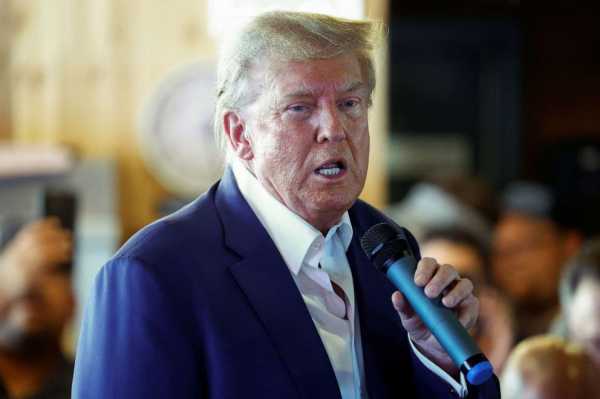
Republican presidential candidate and former President Donald Trump campaigns at the Iowa State Fair in Des Moines, Iowa, on Aug. 12, 2023.Evelyn Hockstein/Reuters
Alternatively, ordinary citizens could file challenges on the same grounds with state election officials themselves.
Either scenario is almost certain to face legal and political blowback, and the argument could end up before the U.S. Supreme Court.
The most immediate hurdle for those disqualification efforts might be timing as the legal challenges must be brought during specific time periods that vary depending on the state where they are brought.
Plans materialize at state level
On Tuesday, Bryant "Corky" Messner, a lawyer who lives in New Hampshire, became the first person to announce concrete plans to do just that.
Messner was endorsed by Donald Trump when he ran for a New Hampshire's U.S. Senate seat in 2020. Now, he says that as a veteran and a graduate of West Point, his civic duty compels him to try to keep Trump off the ballot.
"I really don't view myself as turning on Trump, as odd as that sounds," he told ABC News. "I love this country. I've served this country. I've taken an oath to this country. My sons are serving right now and I believe someone's got to step up to defend the Constitution."
Messner first announced his plans on a local radio show, NH Today, on Tuesday morning.
He says he is still doing initial legal due diligence on the topic and finding a lawyer to bring the case. He plans to finance the legal challenge himself and through his own personal network.
New Hampshire's Secretary of State Office confirmed to ABC News that Messner met with Secretary of State David Scanlan Friday to discuss Section 3 of the 14th Amendment.
"Secretary Scanlan will be conferring with the New Hampshire Attorney General and other legal counsel on this issue; however, he believes any action taken under this Constitutional provision will have to be based on Judicial guidance," Anna Sventek, communications director for Scanlan, told ABC News in a statement.
Citizens for Responsibility and Ethics in Washington (CREW), another legal advocacy group, is also pursuing a push to this effect. Last September, CREW was successful in its effort to remove a New Mexico county commissioner from his post due to his participation in the Jan. 6 attack on the U.S. Capitol.
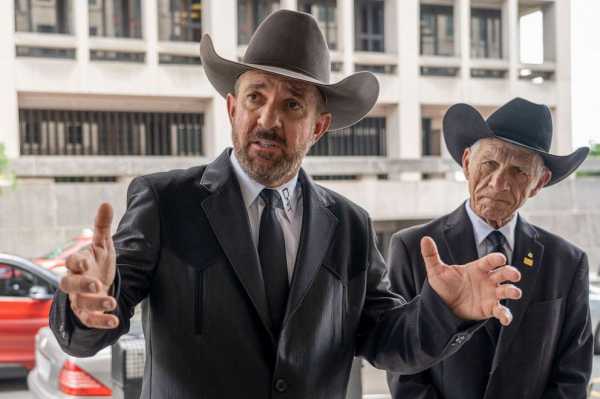
In this June 17, 2022, file photo, Otero County, New Mexico Commissioner Couy Griffin speaks to reporters as he arrives at federal court in Washington, D.C.Gemunu Amarasinghe/AP, FILE
A federal judge in New Mexico barred Otero County commissioner and "Cowboys for Trump" founder Couy Griffin, citing a clause in the 14th Amendment that prohibits those who have engaged in insurrection from serving. Griffin was convicted of a misdemeanor trespass charge. The judge's ruling was the first time in 150 years that the provision has been used to disqualify an official and the first time that a court has ruled the events of Jan. 6 were an "insurrection."
Griffin was arrested on Jan. 8, 2021, on a federal misdemeanor trespassing charge related to the Jan. 6, 2021 insurrection. Griffin was convicted of the charge on March 22 and sentenced on June 17 to 14 days time served, ordered to pay $500 restitution, pay a $3,000 fine, complete community service and one year of supervised release.
Following Trump's announcement that he would make a third bid for the White House, CREW released a statement saying it would work to ensure that Trump is disqualified from ever holding office again.
"We warned him that should he decide to run again, we would be taking action to ensure the Constitution's ban on insurrectionists holding office is enforced," a statement from CREW said. "Now we will be. Trump made a mockery of the Constitution he swore to defend, but we will see that it is defended."
In an interview with ABC News, a CREW official said its focus now is doing whatever possible to keep Trump off the ballot.
"I will say we are focused on winning. We are not focused on getting our name in the paper … We are focused on bringing the strongest cases possible in order to win and hold the former President accountable. And we are making the strategic choices in order to effectuate that," CREW Executive Vice President and Chief Counsel Donald Sherman said.
MORE: Judge removes local official for engaging in Jan. 6 'insurrection'
Free Speech For People, an organization that unsuccessfully challenged the candidacies of several members of Congress in 2022 under the disqualification clause of the 14th Amendment, also plans to take similar actions to attempt to prevent Trump from running for office.
The organization plans to pursue two different paths. The first path involves sending a letter to all 50 secretaries of state asking them to exercise their authority to rule that Trump is disqualified under Section 3 of the 14th Amendment. The second path, when the timing is right, they said, is to file legal challenges to Trump's eligibility for office using state law procedures where available.
Ron Fein, a lawyer involved in the organization's effort to prevent Trump from holding office, told ABC News that they are prepared to take on the former president.
"We're prepared to challenge Trump's candidacy in multiple states. We're not going to tell him which states and when in advance," Fein said. "We have assembled top-notch legal teams and are working with voters in these multiple states and partners outside as well."
Trump's campaign team is preparing for the challenges, telling the Washington Post in April the former president is being targeted.
"What these undemocratic organizations are doing is blatant election interference and tampering," Trump campaign spokesman Steven Cheung said in a statement to the Washington Post. "They are not even trying to hide it anymore and it is sad they want to deprive the American people of choosing Donald Trump — the overwhelming front-runner by far — as their President. History will not judge them kindly."
Trump has denied any involvement in the attack on the Capitol.
ABC News has reached out for comment to Trump's campaign team.
Challenges ahead
Still, as the efforts to keep Trump off the ballot for his alleged role around the attack on the Capitol and efforts to overturn the election grow, constitutional scholar and political science professor Kevin Wagner told ABC News in an interview the challenge to the former president's candidacy faces an up hill battle, due in part because there is no consensus on if Jan. 6 was an insurrection.
"The challenge here is that the 14th Amendment isn't necessarily self-executing. In other words, it doesn't just automatically happen and there is some question about what it means to be engaged in insurrection or rebellion and how that is defined. The challenge for us is that historically, it hasn't been well-defined," Wagner, a professor at Florida Atlantic University, said.
"The question is about what is "participating in a rebellion or an insurrection." There is dispute and people feel strongly what happened was essentially an insurrection — and it's often referred to that way fairly regularly — but others have suggested that this was a protest that may have gotten out of hand — and may have even become criminal — but didn't rise to a level of a rebellion or an insurrection. And the provision of the 14th Amendment really turns on how it is that we assess what happened," he said.
Sourse: abcnews.go.com
